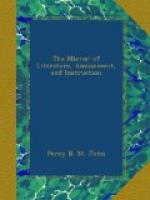The story of the Sorrows of Rosalie (there’s music in the name) is not of uncommon occurrence; would to heaven it were more rare. Rosalie, won by her omnipotent lover, Arthur, leaves her aged father; is deceived by promises of marriage, and at length deserted by her seducer. She seeks her betrayer in London, (where the many-headed monster, vice, may best conceal herself,) is repulsed, and after enduring all the bitterness of cruelty, hunger, and remorse, she returns to her father’s house; but nothing of him and his remains but his memory and his tomb. She is then driven to dishonesty to supply the cravings of her child—is tried and acquitted. During her imprisonment, the child dies; distress brings on her temporary insanity; but she at length flies to a secluded part of the country, and there seeks a solace for her miseries in making peace with her offended Maker.
We can only detach a few portions of the poem, just to show the intensity with which even common scenes and occurrences are worked up. Here is a picture of Rosalie’s happy home:
Home of my childhood! quiet, peaceful
home!
Where innocence sat smiling on my brow,
Why did I leave thee, willingly to roam,
Lured by a traitor’s vainly-trusted
vow?
Could they, the fond and happy, see me
now,
Who knew me when life’s early summer
smiled,
They would not know ’twas I, or
marvel how
The laughing thing, half woman and half
child,
Could e’er be changed to form so
squalid, wan, and wild.
I was most happy—witness
it, ye skies,
That watched the slumbers of my peaceful
night!
Till each succeeding morning saw me rise
With cheerful song, and heart for ever
light;
No heavy gems—no jewel, sparkling
bright,
Cumbered the tresses nature’s self
had twined;
Nor festive torches glared before my sight;
Unknowing and unknown, with peaceful mind,
Blest in the lot I knew, none else I wished
to find.
I had a father—a gray-haired
old man,
Whom Fortune’s sad reverses keenly
tried;
And now his dwindling life’s remaining
span,
Locked up in me the little left of pride,
And knew no hope, no joy, no care beside.
My father!—dare I say I loved
him well?
I, who could leave him to a hireling guide?
Yet all my thoughts were his, and
bitterer fell
The pangs of leaving him, than
all I have to tell.
And oh! my childhood’s home was
lovelier far
Than all the stranger homes where I have
been;
It seem’d as if each pale and twinkling
star
Loved to shine out upon so fair a scene;
Never were flowers so sweet, or fields
so green,
As those that wont that lonely cot to
grace
If, as tradition tells, this earth has
seen
Creatures of heavenly form and angel race.
They might have chosen that spot to be
their dwelling place.
The first approach of her lover is thus told:




